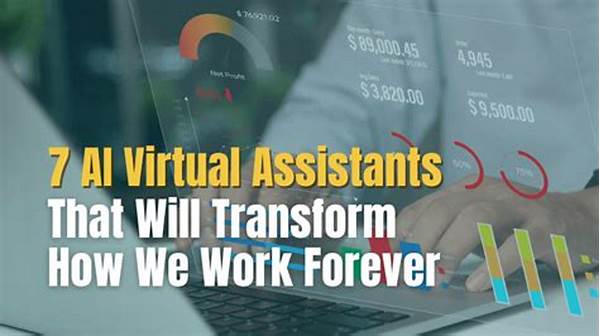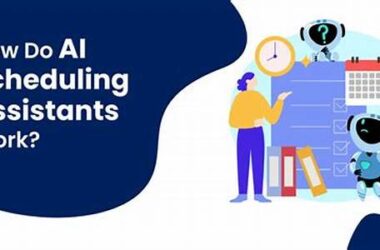- The Rise of Digital Co-Workers
- Discussion: Why AI Virtual Assistants Are Becoming Office Norms
- Examples of Why AI Virtual Assistants Are Becoming Office Norms
- The Purpose of AI Virtual Assistants in Offices
- Illustrations of Why AI Virtual Assistants Are Becoming Office Norms
- Descriptive Insights Into AI Virtual Assistants
- Why AI Virtual Assistants Are Becoming Office Norms: Effective Content Strategy
In the ever-evolving corporate landscape, businesses are continually seeking innovative solutions to enhance productivity, streamline operations, and foster collaboration. Enter the age of AI virtual assistants—a phenomenon increasingly becoming the norm in modern offices worldwide. Picture a bustling office setting where tasks are seamlessly managed, schedules synchronized, and communications streamlined, all thanks to these digital whizzes. With the rise of artificial intelligence, what was once a futuristic vision has become an integral reality in today’s workplace dynamics. Companies are increasingly recognizing the value of AI virtual assistants in optimizing operational efficiencies and elevating employee productivity. Amidst deadlines and project deliverables, these intelligent assistants alleviate routine burdens, allowing human professionals to focus on innovation and strategic decision-making. But what exactly propels this trend? Why are AI virtual assistants becoming office norms, reshaping how we work, communicate, and thrive in professional settings?
Read More : How Ai Enhances Team Collaboration In Offices
As organizations strive to maintain a competitive edge, adopting advanced technological tools like AI virtual assistants transforms from luxury to necessity. Employees often find themselves inundated with repetitive, time-consuming tasks, which detract from more value-driven endeavors. AI virtual assistants, equipped with capabilities like scheduling management, data organization, and even customer service functions, remove friction points, creating smoother workflow experiences. From answering queries to transcribing meetings, their efficiency knows no bounds, freeing teams to concentrate on core business activities. Furthermore, the integration of AI assistants signifies an innovative corporate culture, one that boldly embraces future-forward solutions, positioning businesses as industry trailblazers.
Moreover, the customization potential of AI virtual assistants aligns with distinct organizational needs, providing scalable solutions that adapt to various office dynamics. Whether a startup striving to ground its presence or a multinational corporation juggling multiple departments, these digital allies adjust their functionalities to suit precise operational demands. The cost-effectiveness of implementing AI technology, when juxtaposed with the potential manpower savings, further underscores why AI virtual assistants are becoming office norms. Beyond financial incentives, there exists an underlying quest to foster creativity and analytic aptitude among employees, clearing cognitive space for in-depth problem-solving and innovation pursuits.
The Rise of Digital Co-Workers
AI virtual assistants exemplify the epitome of modern work companions, swiftly transitioning from novelty gadgets to everyday essentials in many organizations. The reason behind why AI virtual assistants are becoming office norms primarily revolves around their unparalleled efficacy in task automation and process optimization. They’re not just about handling menial tasks faster; they’re about doing them smarter. These assistants learn and adapt to user preferences, ensuring that each interaction is more intuitive and efficient than the last. As technology evolves, so does the sophistication of AI virtual assistants, promising further enhancements in the approaching digital work era.
—
Discussion: Why AI Virtual Assistants Are Becoming Office Norms
In the bustling world of corporate business, the introduction of AI virtual assistants is akin to discovering a reservoir of untapped potential. Previously burdened by mundane tasks, employees can reimagine their roles and contribute more meaningfully to the company’s strategic goals. The excitement surrounding why AI virtual assistants are becoming office norms is palpable as businesses experience firsthand the transformative power of automation. Through storytelling and persuasive narratives, the potential of these digital aids becomes vividly apparent.
Employee testimonials paint a vivid picture of the impact AI companions have on daily operations. “My AI assistant schedules meetings and prioritizes my emails, allowing me to concentrate on critical tasks,” says one satisfied user. Another reports, “It’s like having an additional team member who never tires!” Humorously, some even christen their AI colleagues with names, echoing the growing bond between human and machine. Such anecdotes highlight how AI virtual assistants integrate seamlessly into the fabric of office life, providing efficiency with a personal touch.
From a marketing vantage, businesses that adopt these digital tools enjoy a unique selling point, showcasing their commitment to technological advancement. In an age where digital literacy defines competitiveness, organizations are eager to project an image of innovation and adaptability. Clients and partners take note, associating such companies with reliability and modern thinking. Why AI virtual assistants are becoming office norms can partially be attributed to this powerful brand perception shift.
The emotional appeal lies in the promise of reduced stress and enhanced job satisfaction. Employees are no longer tethered to tedious tasks; instead, they channel energy toward creative and impactful contributions. The office becomes a learning hub, focused on value creation rather than task completion. This paradigm shift not only boosts morale but also encourages retention, as workers find increased fulfillment in their roles. AI virtual assistants fundamentally transform work culture from the inside out.
Finally, the implementation of AI virtual assistants serves as both a rational and emotional choice. The data-backed advantages—such as time savings and error reduction—offer tangible metrics of success. Companies witness notable improvements in workflow processes and resource allocation, substantiating the investment in AI technology. Yet, beyond the numbers lies an emotional narrative of empowerment and progress. Through persuasive storytelling, businesses can engage stakeholders in this vision, advocating for widespread adoption of AI virtual assistants.
The Efficiency Revolution
Why AI virtual assistants are becoming office norms is akin to a revolution in efficiency. These sophisticated programs are not just supporting roles in the office hierarchy; they are essential partners in operational strategy. Imagine a world where employees no longer juggle calendars or sift through endless amounts of data. Instead, they rely on nimble AI assistants to lift these burdens off their shoulders, allowing creativity and strategic thinking to flourish. The AI revolution is restructuring office norms, setting new benchmarks for productivity and innovative collaboration.
Embracing the Future of Work
In the landscape of modern enterprises, embracing digital transformation is crucial. Why AI virtual assistants are becoming office norms can be seen as a deliberate step towards this future-focused approach. Continuous training and updates enhance the capabilities of AI systems, ensuring they remain invaluable assets in rapidly changing environments. As organizations integrate these technologies further, the future of work promises to be an exciting fusion of human ingenuity and digital intelligence.
—
Examples of Why AI Virtual Assistants Are Becoming Office Norms
The Purpose of AI Virtual Assistants in Offices
AI virtual assistants serve a pivotal role in the modern workplace by fulfilling several essential functions. Primarily, they aim to automate routine and time-consuming tasks, freeing employees to concentrate on strategic initiatives and creative endeavors. The ability to efficiently manage calendars, answer emails, and organize data allows teams to maintain a sharp focus on impactful projects, ultimately enhancing overall productivity. Consequently, why AI virtual assistants are becoming office norms is directly linked to this heightened efficiency and streamlined operations.
Beyond task management, AI virtual assistants foster a collaborative work environment by integrating seamlessly with existing digital systems and tools. This integration facilitates smooth communication between team members, departments, and even external stakeholders. As organizations continue to embrace digital transformation, AI virtual assistants are quintessential in bridging gaps, ensuring that information flows unhindered across various platforms. The convergence of these capabilities positions AI assistants as indispensable components in the quest for business excellence and innovation, driving the momentum for why AI virtual assistants are becoming office norms.
Tomorrow’s Workplace
Predicting the future involves acknowledging emerging trends, and why AI virtual assistants are becoming office norms is a testament to this evolution. They embody the tapestry of tomorrow’s workplace, where robots and humans coalesce to achieve ambitious business objectives. Their integration symbolizes forward-thinking—embracing cutting-edge technology while nurturing traditional values of teamwork and innovation.
Championing Change
To champion change in today’s dynamic business environment, businesses must actively encourage AI adoption as a transformative asset. AI virtual assistants are more than just tools; they represent a fundamental shift in how work is approached and executed. Harnessing their power promises not only cost-effective solutions but also a workforce that thrives on creativity and strategic thinking. Engaging with this change leads businesses into a future marked by exponential growth and success.
—
Illustrations of Why AI Virtual Assistants Are Becoming Office Norms
Descriptive Insights Into AI Virtual Assistants
As AI technology progresses, so too does its application in professional environments. The core idea behind why AI virtual assistants are becoming office norms can be traced back to their profound ability to revolutionize traditional workspaces. Imagine an office ecosystem where manual scheduling conflicts or the hassle of endlessly digging through data for insights are relics of the past. Here, AI assistants operate as agile collaborators, utilizing machine learning algorithms to continuously improve in efficiency and accuracy. Organizations that embrace these innovations find themselves ahead of the curve, navigating the complexities of modern business landscapes with ease.
Moreover, AI virtual assistants represent more than operational improvements—they embody a new business ethos. In the narrative of transformation, these digital tools symbolize a shift towards sustainable growth, where human capital is revered and utilized in roles that maximize potential. As employees are freed from mundane tasks, they contribute more dynamically to an organization’s strategic goals, cultivating a culture where creativity and initiative reign supreme. The implications for why AI virtual assistants are becoming office norms go beyond implementing technology; they signify a thoughtful approach to modernizing work, simultaneously respecting tradition and championing progress.
Pioneering Perspectives
Organizations trailblazing in this realm manifest a pioneering spirit, embracing AI virtual assistants to overhaul traditional norms. With innovation at the forefront, why AI virtual assistants are becoming office norms is as much about cultivating forward-thinking cultures as it is about technology.
Navigating Future Horizons
By unlocking AI’s full potential, enterprises can skillfully navigate future horizons, leveraging these technologies to propel business success and harmonic employee engagement. As AI evolves, these digital stewards will continue to reshape the contours of professional landscapes, guiding enterprises toward sustained growth and prosperity.
—
Why AI Virtual Assistants Are Becoming Office Norms: Effective Content Strategy
Artificial Intelligence (AI) has seamlessly integrated into various aspects of modern business, metamorphosing the landscape of corporate efficiency and operational dexterity. The core rationale why AI virtual assistants are becoming office norms encapsulates the quest for heightened productivity and strategic foresight. Across the globe, offices are witnessing a silent revolution where these intelligent assistants not only tackle mundane chores but also augment team dynamics and foster organizational coherence.
The transition to AI virtual assistants is much akin to embracing an era of enlightened interaction within business ecosystems. Employees find themselves liberated from the constraints of administrative burdens, navigating their tasks with newfound agility and focus as AI co-pilots their workplace journey. Not merely reactionary tools, these digital assistants proactively spearhead innovation—always learning, evolving, and adapting to the unique contours of each corporate need they serve.
Peppering Productivity with AI Magic
Central to why AI virtual assistants are becoming office norms is their incredible capacity to supercharge productivity landscapes. By weaving together schedules, collating data, and streamlining communications, these assistants manifest a cogent command over routine operations. The resulting landscapes are fertile grounds where employees are empowered to cultivate creative solutions and spearhead initiatives that drive the strategic mission of their organizations.
Office Ecosystems Reimagined
Furthermore, the integration of AI transforms office ecosystems into digitally unified enterprises, where cross-departmental information flows seamlessly and barriers to communication are systematically dismantled. The intelligent synthesis of interaction and information ensures that strategic objectives are met without redundancy or delay. By embedding AI functionalities into daily operations, organizations fortify themselves against future challenges and downturns, asserting their relevance in competitive markets.
Insights-Driven Decision Making
Supplementing AI’s functional prowess is its key role in fostering insights-driven decision-making processes. By consolidating disparate data into coherent wholes, AI virtual assistants provide executives and teams with incisive analyses that guide informed strategies. This intelligent data utilization showcases why AI virtual assistants are becoming office norms, as organizations recognize that data-driven decisions yield competitive advantages and sustained growth.
Embracing Change in a Digital Age
However, the full embrace of AI technology in offices is not bereft of challenges or adaptation. It necessitates a culture willing to adapt, continuously learning and evolving in step with technological advances. Organizations that earnestly champion this digital transformation cultivate a forward-thinking ethos, setting the stage for a workforce that thrives in novelty and relishes exploration.
Digital Co-Creators of Workplace Harmony
In summary, why AI virtual assistants are becoming office norms is a multifaceted narrative of liberation, innovation, and strategic foresight. These incredible tools serve as digital co-creators of workplace harmony, orchestrating operational symphonies that transcend traditional paradigms. As businesses immerse deeper into this AI-driven era, they solidify their presence as pioneers of progressive workplace adaptation, perfectly attuned to the rhythms of modern market dynamics.



